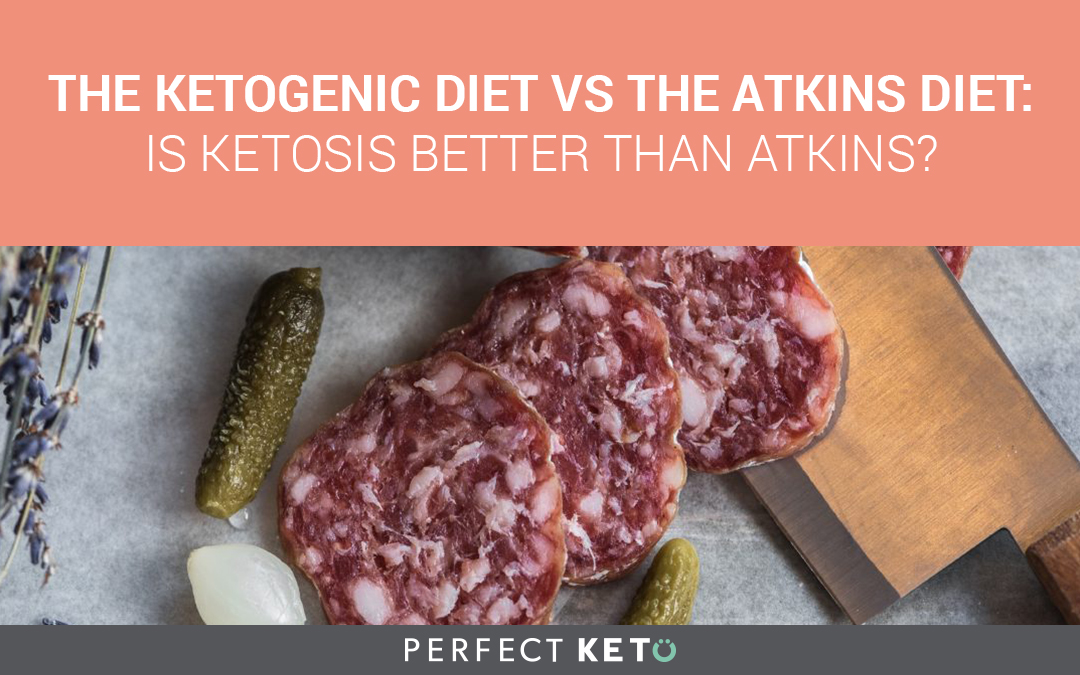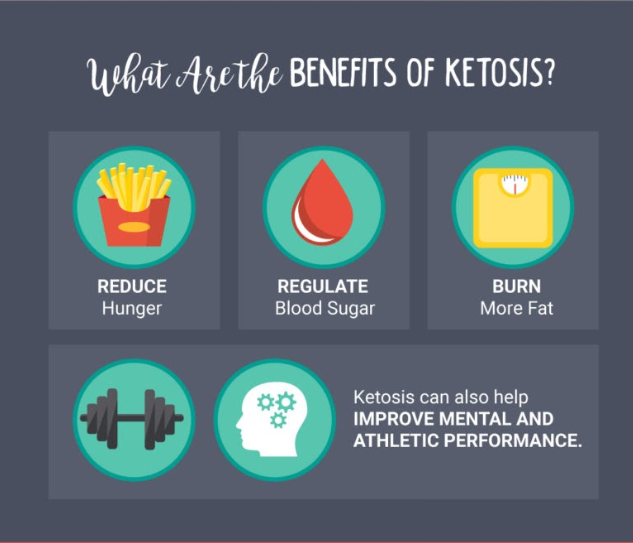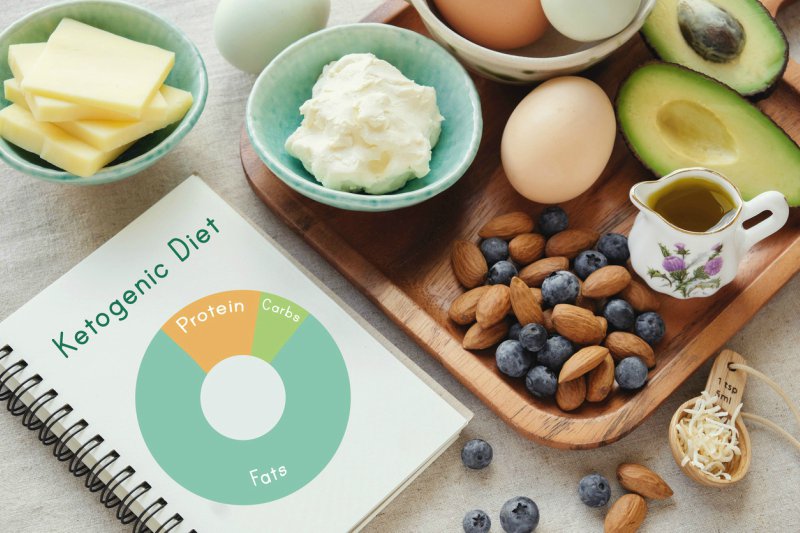
It’s not uncommon for the ketogenic diet and the famous Atkin’s Diet of the 1990’s to get lumped into the same conversation as one and the same.
But are they actually different, and is one healthier than the other? Which is more impactful over the long term?
There are definitely differences between the two diets, and the real comparison might surprise you! But first, let’s step back and look at them individually.
The Ketogenic Diet
The ketogenic diet was founded all the way back in 1924 by Dr. Russell Wilder at the famous Mayo Clinic. The diet was initially used because it was discovered to be highly effective in treating epilepsy.
The principles of the ketogenic diet are based on eating a specific percentage of macronutrients: high fats (60%), adequate protein (35%), and low carbohydrates (5%), to force the body to use what are called “ketone bodies” for energy.
In the absence of carbohydrates for an extended period of time, our liver converts fats into fatty acids and ketone bodies, also just simply called “ketones.” Ketones can then be processed into ATP, which is the energy currency of the cells.
Now, an elevated level of ketone bodies in the blood leads to a state known as nutritional ketosis.
Benefits of the Ketogenic Diet
There are several ways the ketogenic diet can help the health and lifestyles of those who follow it. Here are some of the biggest advantages:
Blood Sugar Stabilization
The ketogenic diet actively helps to lower glucose levels and improve insulin resistance. Without having frequent carbohydrate intake, blood sugar levels can stabilize more rapidly.
Trigger Fat Burning
Ketogenic diets can also be very effective for fat loss because they ultimately reset your body’s “enzymatic machinery” to burn fat as its primary fuel source in the absence of carbohydrates. This makes the diet extremely effective for getting lean.
Faster Weight Loss
In a recent study on the effects of a ketogenic diet over a 24-week period, it was discovered that patients in the low-carbohydrate group lost more fat, had a greater decrease in triglyceride levels, and had higher high-density lipoprotein cholesterol levels.
Smarter Exercise
Bodybuilders preparing for competitions (and people on weight loss journeys) who need to yield quicker-than-normal results opt for the keto diet because of its low carb intake — around 30 grams of net carbs per day.
Ketogenic diets can also be very powerful for exercise advantages. You need less oxygen to make energy (ATP) from ketone bodies than from carbohydrates, so the demands for oxygen are much less when exercising. This can help drastically increase endurance performance benefits.
Improved Brain Health
Since ketone bodies easily cross the blood-brain barrier, your brain can use them efficiently for energy, leading to sustained mental performance advantages as well.
The downside to the ketogenic diet is that you have to measure often to be sure you’re in nutritional ketosis (burning ketone bodies for energy). Simply eating a lower carbohydrate diet usually isn’t enough, as your body can use protein and muscle tissue and turn them into carbohydrates.
Therefore, your diet choices have to be very calculated and specific. There are some supplements that help you get into ketosis immediately. If you don’t have those, you may need to test your ketone levels and measure your food intake very closely.

So, let’s recap:
Ketogenic Diet Pros
- Ketone bodies increase physical performance
- Ketosis leads to efficient fat loss
- Ketone bodies (ketones) improve mental performance
- Many other health benefits
Ketogenic Diet Cons
- Diet can be somewhat restrictive if not taking supplements
- Have to measure food if not taking supplements
- Typically have to measure if you’re in or out of ketosis in the beginning
We have more information in these posts: What is the Ketogenic Diet? and What is Ketosis?. Moving on though!
The Atkins Diet
Now that we’ve established what the ketogenic diet is, what’s all the fuss about the Atkins Diet? The Atkins Diet began a media storm when it initially came out, prompting men and women alike to follow its regime of supposedly effortless fat loss and promises of better health.
The diet is the product of Dr. Robert Coleman Atkins, an American physician and cardiologist who developed a diet severely restricting carbohydrate intake.
Benefits of the Atkins Diet
The Atkins Diet is one of the most famous “fast track” diets around and claims that you can lose a considerable amount of fat quickly by eating as much protein and fat as you want — as long as you avoid foods high in carbs.
The diet claims to have been proven in over 80 clinical studies. Of course, restricting your calorie intake so much will have your body burning through it’s fat stores at an accelerated rate anyway, meaning there’s nothing complex about this system in a theoretical sense.
Comparing Atkins to Keto
The Atkins Diet differs from the keto diet in that Atkins has an “introductory” phase where the dieter follows very similar nutrient ratios on the ketogenic diet. During this introductory phase on Atkins, carb intake is set at roughly 15-30 grams per day maximum, which helps to promote fat burning within the body instead of using glycogen for energy.
This is what ultimately leads to the state of ketosis achieved when following the ketogenic diet. The Atkins diet differs in that the dieter is actually able to introduce more carbohydrates (albeit still a very limited quantity) once this initial introduction phase has come to an end.
The initial results for those on Atkins were promising for a low carbohydrate diet because of lowering blood sugar, but they weren’t getting all of the benefits of the ketogenic diet.
Plus, when too much (an unlimited amount) of protein is consumed, your body can convert it to carbohydrate to be used for energy, which can stall long-term progress and not lead to any of the benefits that you get out of using ketone bodies for energy on the keto diet.
The Atkins Diet also fell out of popularity after reports that many people were getting sick, gaining weight over the long term, or increasing their blood lipid profile.
There was a heavy encouragement on the Atkins Diet that you could eat whatever you wanted and in whatever amount as long as it wasn’t carbohydrates. This lead to people overeating massive amounts of low-quality food, which lead to health problems.
Atkin’s Diet Pros
- Easy to follow (eat whatever as long as it isn’t carbs)
- Short-term fat loss shown in studies
Atkin’s Diet Cons
- Possible weight gain bounce-back in the long term
- No quality or quantity guidelines
- No mental or physical performance benefits
Keto vs Atkins – Which is Better?
Keto vs. Atkins
At face value, the keto diet and Atkins seem to be pretty similar, since they both focus on low carb — and that’s where people get confused. But as you now know, there are big differences in outcome from each.
The ketogenic diet is a very precise way to eat to change your metabolism and what your body uses for energy. Although it comes with the inconvenience of measuring food and tracking ketone levels, there are now supplements that drastically aid with this, and the results are invaluable for your health and wellbeing.
While the Atkins diet is very easy to follow, it has some true health risks and may not bring the same drastic benefits one can expect from following the more stringent guidelines of the ketogenic diet.
So, when considering the argument of ketosis versus Atkins, it’s a pretty clear choice that ketosis offers much better longer term health benefits once you get used to implementing it in your life
OnKeto.com is a news aggregation service that brings you best of world articles to you for your consumption.
Author: None
Author URL: None
Original Article Location: https://www.perfectketo.com/ketogenic-diet-vs-atkins-diet-ketosis-better-atkins/
